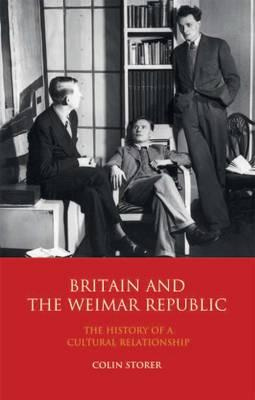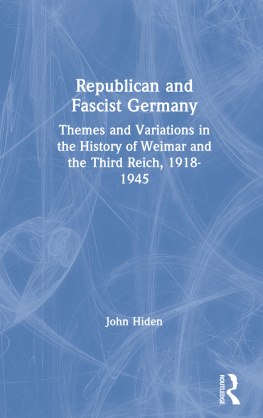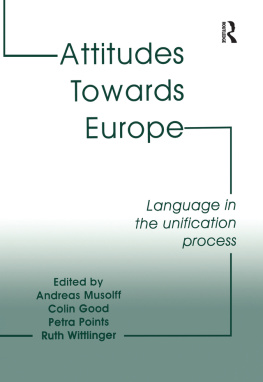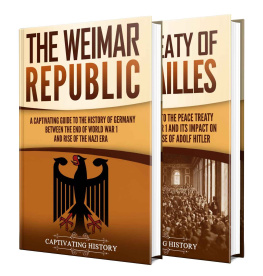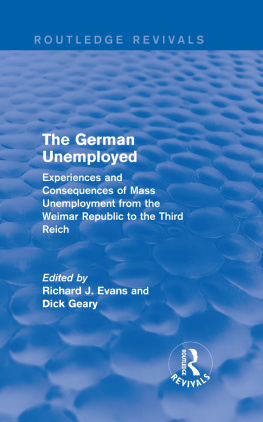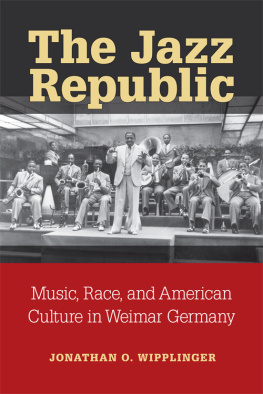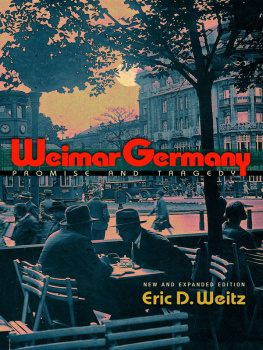ABBREVIATIONS
BL British Library
CAB Cabinet Office Papers
DBFP Documents in British Foreign Policy 1919-1939
ESW Sackville-West Papers
FAV F. A. Voigt Papers
FSC Film Society Collection
GA Guardian Archive
IWM Imperial War Museum
KV Records of the Security Service
TCA Thomas Cook Archive
WHC Winifred Holtby Collection
WHD W. H. Dawson Papers
ACKNOWLEDGEMENTS
The present volume, like another much more famous book, was a tale that grew in the telling. It began life as postgraduate research into British perceptions of the German Revolution of November 1918, grew into a PhD thesis on the attitudes of British intellectuals towards the Weimar Republic and from there mutated into the work you now hold in your hands. During this long drawn out process I have incurred many debts and it is only fitting that those who have provided me with help and support are acknowledged here.
A great many thanks are due to a number of individuals who aided me in the production of this book: Professor Dick Geary for his encouragement, enthusiasm and above all his patience while supervising the doctoral research on which it is based; Professor Chris Wrigley who first suggested I look at the works of W. H. Dawson and whose comments and advice were invaluable to me; and Professor Jonathan Osmond who provided me with helpful comments and suggestions. I have benefited from conversations with Dr. Christian Haase of the University of Nottingham and Dr. Nicole Robertson of the University of Northumbria who also provided support and encouragement. I would also like to acknowledge the debt I owe to numerous friends and relatives who displayed an interest in the project and/or put up with my absorption in it, particularly Dr. Margaret Stone and Mr. Paul Peros who read the manuscript at various stages and provided kind and constructive criticism and suggestions.
My research could not have been completed without the aid and assistance of numerous hardworking librarians and archivists and I owe a great deal to the staff of the various libraries and archives visited during the course of my research. I would particularly like to thank all the staff of the University of Nottinghams Hallward Library, and their interlibrary loan staff in particular, for all their help over the years. I would also like to express my gratitude to David Smith and all the staff at Hull Central Library, James Turtle and the staff of the Gloucester Public Records Office, Paul Smith of the Thomas Cook Archive, the staff at the British Film Institutes National Film Library, the staff at the British Library and the National Archives, and the staff of the Special Collections Departments of Birmingham University Library and the John Rylands University Library of Manchester for their help and courtesy. Special thanks is also due to Mr. Edward Upward, Mrs. E. E. Barquin and Professor Thorlac Turville-Petre who all answered my enquiries with good grace and provided me with much helpful information that would otherwise have been unavailable to me.
I would like to thank the Holtby literary executor for permission to quote from papers in the Winifred Holtby Collection; Robert Sackville-West (Lord Sackville) for permission to quote from the papers of Edward Sackville-West; The Wyndham Lewis Memorial Trust for permission to quote from letters written by Wyndham Lewis and held in the British Library; and the National Archives for permission to quote extracts from Cabinet Office Papers. Extracts from the letters and poems of W. H. Auden are printed with the permission of the estate of W. H. Auden. I have attempted to contact the holders of copyright on the works of individual writers, but unfortunately some of my enquiries have remained unanswered. If I have inadvertently infringed the copyright of any person I apologise sincerely.
Much of what now makes up chapter five was first presented as a paper to the Home, Nation and Empire: Reading Gender from the Eighteenth Century to the Present Day conference at the University of Manchester in July 2007 and subsequently appeared as Weimar Germany as seen by an Englishwoman: British Women Writers and the Weimar Republic in the German Studies Review, Vol. 32, No. 1 (2009). Some of the material in chapters three, five and six has also already appeared in print in the German Studies Review and the Journal of European Studies and I would like to thank those publications for permission to reproduce that material here.
Finally, I would like to thank my family, and in particular my parents, to whom this book is dedicated, for their unfailing encouragement and support: I owe them more than they can ever know.
1. INTRODUCTION
When he came to draft his autobiography in the mid-1940s, the pianist, novelist and critic Edward Sackville-West wrote that
[t]he young Englishman of my generation (that of 1900), since he was the heir of predominantly northern ideals, often began by feeling more at home in Central Europe than in any Latin country. Fascinated by the Gothic ambiguities of the German heart, and charmed by the cosiness of the bourgeois interior, he surrendered willingly to an atmosphere that permitted him to absorb its strangeness by easy stages.
Sackville-West was far from being alone in finding the Gothic ambiguities of the German heart fascinating. Large numbers of his contemporaries were also keenly interested ... in German life and character during the 1920s. Indeed, the Germany of the Weimar Republic (and in particular its capital, Berlin) exercised a peculiar fascination for young Britons born after 1900, but it also attracted the attention of British men and women born in the last forty years of the nineteenth century in almost equal numbers. This seems to have been particularly true for those actively engaged in the fields of art, literature and journalism, to the extent that any list of intellectual visitors reads like a whos who of British literary and artistic talent of the interwar period. Why should this be the case? What made a country that had recently been the enemy in the most destructive conflict Europe had ever known so attractive and fascinating to British intellectuals of the 1920s?
One simplistic answer might be that it was ever thus. As John Mander points out, there was virtually no concept in Britain of a homogenous German ethnic or cultural, let alone political, entity before Madame de Staels De IAllemagne (1813), which was instrumental in introducing German literature to the British. while a later generation of British statesmen and bureaucrats, Alfred Milner and R. B. S. Haldane among them, were steeped in German culture. Throughout the nineteenth century Prussia, and then Germany, attracted the admiration of British thinkers, educationalists and policymakers, while German scholarship especially in the fields of theology, philosophy, philology and archaeology
- was required reading among those in Britain wishing to keep up with the latest research in their fields.. So was the enthusiasm of British intellectuals for Germany in the Weimar period merely an example of cyclical cultural fashions, a rediscovery of a Germany of something other than soldiers and schnitzel? Or was it that the postwar settlement and the formation of the Weimar Republic marked a turning point in German history, placing her at the heart of international developments in politics and the arts and making her seem new and exciting, a nation somehow uniquely in tune with the Zeitgeist of the 1920s?
Much mention has been made thus far of intellectuals, but what do we actually mean by the term in this context? In many ways, it is a troublesome appellation: indeed, it has been suggested that Britain has never really produced any intellectuals of her own. , has been adopted. More specifically, it is used throughout as a shorthand, catch-all term encompassing writers (of both fiction and non-fiction), artists, academics, critics and some journalists. While this study will mainly focus on professional writers of one sort or another (creative writers, journalists, critics and commentators), it also at times makes reference to some memoirists who, while not strictly speaking intellectuals, made important observations in their writings which reflect and/or contradict general themes in British opinion on Germany. At the same time, in order to highlight the wider diversity of British interaction with the Republic, and to place the opinions of intellectuals in context, it will also, on occasion, make reference to other Britons involved with Weimar Germany such as civil servants, military personnel and public figures.

